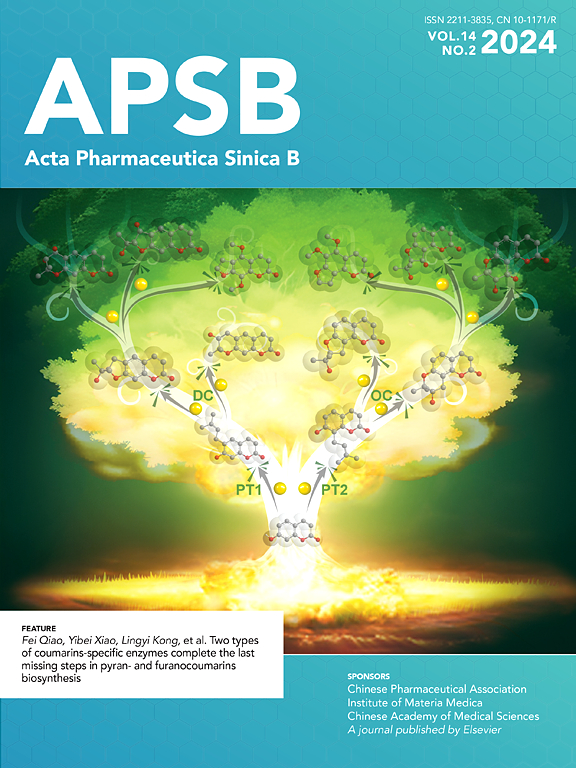First ATG101-recruiting small molecule degrader for selective CDK9 degradation via autophagy–lysosome pathway
IF 14.6
1区 医学
Q1 PHARMACOLOGY & PHARMACY
引用次数: 0
Abstract
Cyclin-dependent kinase 9 (CDK9) is a member of the transcription CDK subfamily and plays a role in transcriptional regulation. Selective CDK9 degraders possess potent clinical advantages over reversible CDK9 inhibitors. Herein, we report the first ATG101-recruiting selective CDK9 degrader, AZ-9, based on the hydrophobic tag kinesin degradation technology. AZ-9 showed significant degradation effects and selectivity toward other homologous cell cycle CDKs in vitro and in vivo, which could also affect downstream related phenotypes. Mechanism research revealed that AZ-9 recruits ATG101 to initiate the autophagy–lysosome pathway, and forms autophagosomes through the recruitment of LC3, which then fuses with lysosomes to degrade CDK9 and the partner protein Cyclin T1. These dates validated the existence of non-proteasomal degradation pathway of hydrophobic driven protein degradation strategy for the first time, which might provide research ideas for chemical induction intervention on other types of pathogenic proteins.

首个atg101招募小分子降解物,通过自噬-溶酶体途径选择性降解CDK9
周期蛋白依赖性激酶9 (Cyclin-dependent kinase 9, CDK9)是转录CDK亚家族的成员,在转录调控中发挥作用。选择性CDK9降解剂比可逆性CDK9抑制剂具有强大的临床优势。在此,我们报道了第一个基于疏水标签激酶降解技术的atg101招募选择性CDK9降解物AZ-9。AZ-9在体外和体内对其他同源细胞周期CDKs具有显著的降解作用和选择性,并可能影响下游相关表型。机制研究表明,AZ-9招募ATG101启动自噬-溶酶体途径,并通过招募LC3形成自噬体,LC3随后与溶酶体融合降解CDK9及其伴侣蛋白Cyclin T1。这些数据首次验证了疏水驱动蛋白降解策略存在非蛋白酶体降解途径,这可能为化学诱导干预其他类型致病蛋白提供研究思路。
本文章由计算机程序翻译,如有差异,请以英文原文为准。
求助全文
约1分钟内获得全文
求助全文
来源期刊

Acta Pharmaceutica Sinica. B
Pharmacology, Toxicology and Pharmaceutics-General Pharmacology, Toxicology and Pharmaceutics
CiteScore
22.40
自引率
5.50%
发文量
1051
审稿时长
19 weeks
期刊介绍:
The Journal of the Institute of Materia Medica, Chinese Academy of Medical Sciences, and the Chinese Pharmaceutical Association oversees the peer review process for Acta Pharmaceutica Sinica. B (APSB).
Published monthly in English, APSB is dedicated to disseminating significant original research articles, rapid communications, and high-quality reviews that highlight recent advances across various pharmaceutical sciences domains. These encompass pharmacology, pharmaceutics, medicinal chemistry, natural products, pharmacognosy, pharmaceutical analysis, and pharmacokinetics.
A part of the Acta Pharmaceutica Sinica series, established in 1953 and indexed in prominent databases like Chemical Abstracts, Index Medicus, SciFinder Scholar, Biological Abstracts, International Pharmaceutical Abstracts, Cambridge Scientific Abstracts, and Current Bibliography on Science and Technology, APSB is sponsored by the Institute of Materia Medica, Chinese Academy of Medical Sciences, and the Chinese Pharmaceutical Association. Its production and hosting are facilitated by Elsevier B.V. This collaborative effort ensures APSB's commitment to delivering valuable contributions to the pharmaceutical sciences community.
 求助内容:
求助内容: 应助结果提醒方式:
应助结果提醒方式:


